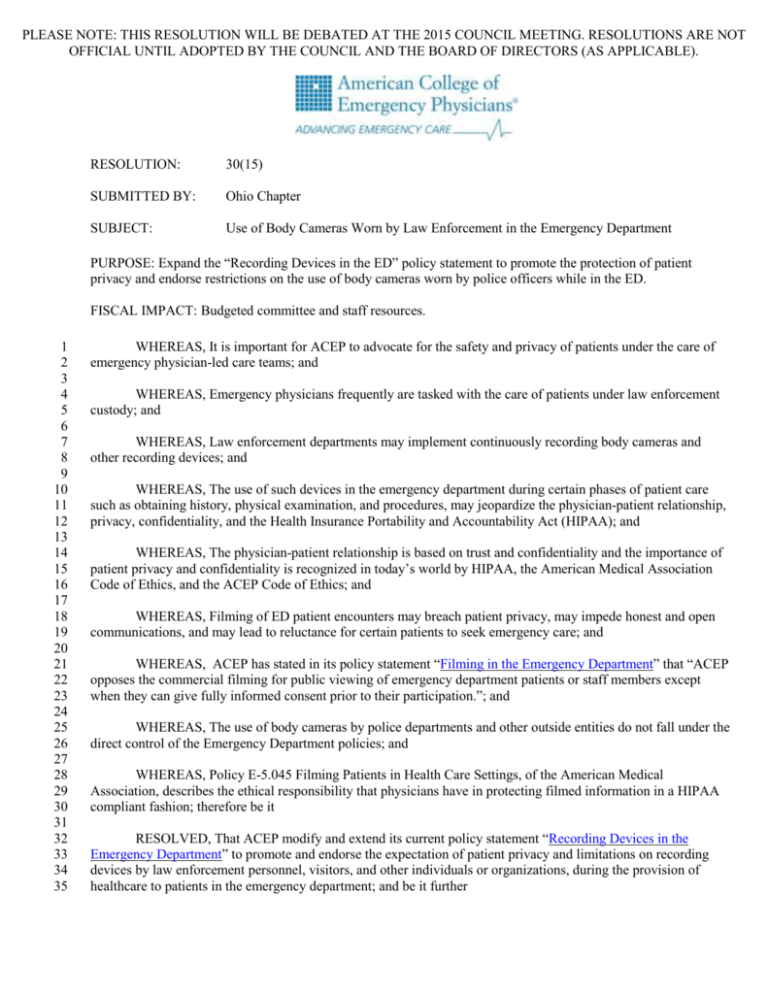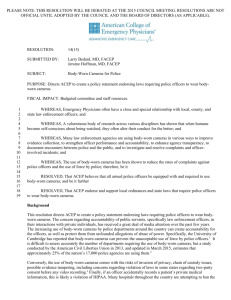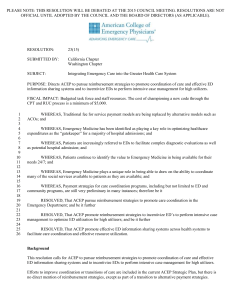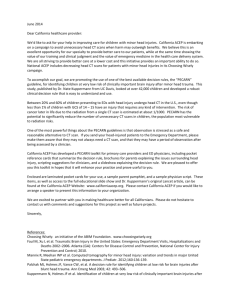AMERICAN COLLEGE OF EMERGENCY PHYSICIANS
advertisement

PLEASE NOTE: THIS RESOLUTION WILL BE DEBATED AT THE 2015 COUNCIL MEETING. RESOLUTIONS ARE NOT OFFICIAL UNTIL ADOPTED BY THE COUNCIL AND THE BOARD OF DIRECTORS (AS APPLICABLE). RESOLUTION: 30(15) SUBMITTED BY: Ohio Chapter SUBJECT: Use of Body Cameras Worn by Law Enforcement in the Emergency Department PURPOSE: Expand the “Recording Devices in the ED” policy statement to promote the protection of patient privacy and endorse restrictions on the use of body cameras worn by police officers while in the ED. FISCAL IMPACT: Budgeted committee and staff resources. 1 2 3 4 5 6 7 8 9 10 11 12 13 14 15 16 17 18 19 20 21 22 23 24 25 26 27 28 29 30 31 32 33 34 35 WHEREAS, It is important for ACEP to advocate for the safety and privacy of patients under the care of emergency physician-led care teams; and WHEREAS, Emergency physicians frequently are tasked with the care of patients under law enforcement custody; and WHEREAS, Law enforcement departments may implement continuously recording body cameras and other recording devices; and WHEREAS, The use of such devices in the emergency department during certain phases of patient care such as obtaining history, physical examination, and procedures, may jeopardize the physician-patient relationship, privacy, confidentiality, and the Health Insurance Portability and Accountability Act (HIPAA); and WHEREAS, The physician-patient relationship is based on trust and confidentiality and the importance of patient privacy and confidentiality is recognized in today’s world by HIPAA, the American Medical Association Code of Ethics, and the ACEP Code of Ethics; and WHEREAS, Filming of ED patient encounters may breach patient privacy, may impede honest and open communications, and may lead to reluctance for certain patients to seek emergency care; and WHEREAS, ACEP has stated in its policy statement “Filming in the Emergency Department” that “ACEP opposes the commercial filming for public viewing of emergency department patients or staff members except when they can give fully informed consent prior to their participation.”; and WHEREAS, The use of body cameras by police departments and other outside entities do not fall under the direct control of the Emergency Department policies; and WHEREAS, Policy E-5.045 Filming Patients in Health Care Settings, of the American Medical Association, describes the ethical responsibility that physicians have in protecting filmed information in a HIPAA compliant fashion; therefore be it RESOLVED, That ACEP modify and extend its current policy statement “Recording Devices in the Emergency Department” to promote and endorse the expectation of patient privacy and limitations on recording devices by law enforcement personnel, visitors, and other individuals or organizations, during the provision of healthcare to patients in the emergency department; and be it further Resolution 30(15) Use of Body Cameras Worn by Law Enforcement in the ED Page 2 36 37 38 RESOLVED, That ACEP promote a position that institutions and physicians should restrict the use of recording devices during patient care and in areas in which discussions containing confidential, HIPAA-protected patient information are likely to occur within the Emergency Department. Background The resolution requests that ACEP expand the “Recording Devices in the ED” policy statement to promote the protection of patient privacy and endorse restrictions on the use of body cameras worn by police officers while in the ED. A large and growing number of police departments throughout the country now require police officers to wear body cameras at all times. With the implementation of body-worn cameras come potential risks to patients’ privacy rights should police officers accompany a patient into the emergency department. Issues such as breach of confidentiality, violations of HIPAA, and invasion of privacy have created concerns for emergency physicians. Many hospitals throughout the country are attempting to ban the use of police-worn cameras in their facilities and some states have enacted legislation to narrow the scope of their use. ACEP’s Ethics Committee has been assigned an objective for the 2015-16 committee year to “Develop a policy statement on the use of body cameras in the ED.” Resolution 14(15) Body-Worn Cameras for Police has also been submitted to the 2015 Council. That resolution directs ACEP to create a policy statement endorsing laws requiring police officers to wear body-worn cameras. ACEP Strategic Plan Reference Promote quality and patient safety, including development and validation of quality measures. Fiscal Impact Budgeted committee and staff resources. Prior Council Action Amended Substitute Resolution 28(01) Filming in the Emergency Department referred to the Board. The resolution called for ACEP to discourage the filming of television programs in emergency departments except when patients and staff members can give fully informed consent prior to their participation. Prior Board Action June 2015, approved the revised policy statement, “ Commercial Filming of Patients in the Emergency Department;” originally approved February 2002 with the title, “Filming in the Emergency Department,” and revised and approved February 2009. May 2001, reviewed the proposed resolution “Filming in the Emergency Department” submitted by the Ethics Committee. The Board declined cosponsoring the resolution and suggested at least two members of the Ethics Committee submit the resolution and include the draft information paper, “Ethical Implications of the Use of Recorded Images in the Emergency Department,” as background information. The Board directed that the information paper be finalized after the Council was provided the opportunity to debate the issue. Background Information Prepared by: Leslie Patterson Moore, JD General Counsel Reviewed By: Kevin Klauer, DO, EJD, FACEP, Speaker James Cusick, MD, FACEP, Vice Speaker Dean Wilkerson, JD, MBA, CAE, Council Secretary and Executive Director










